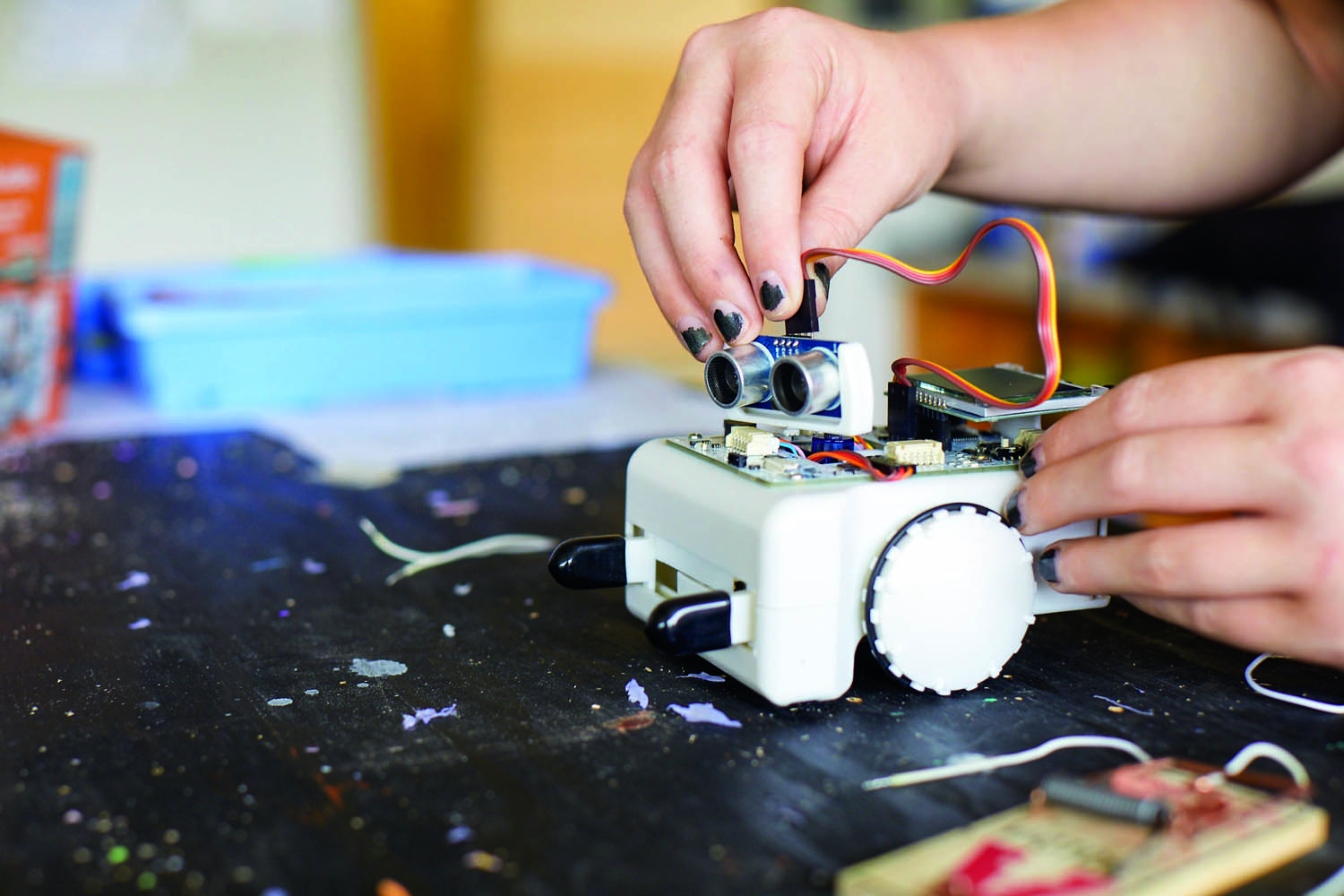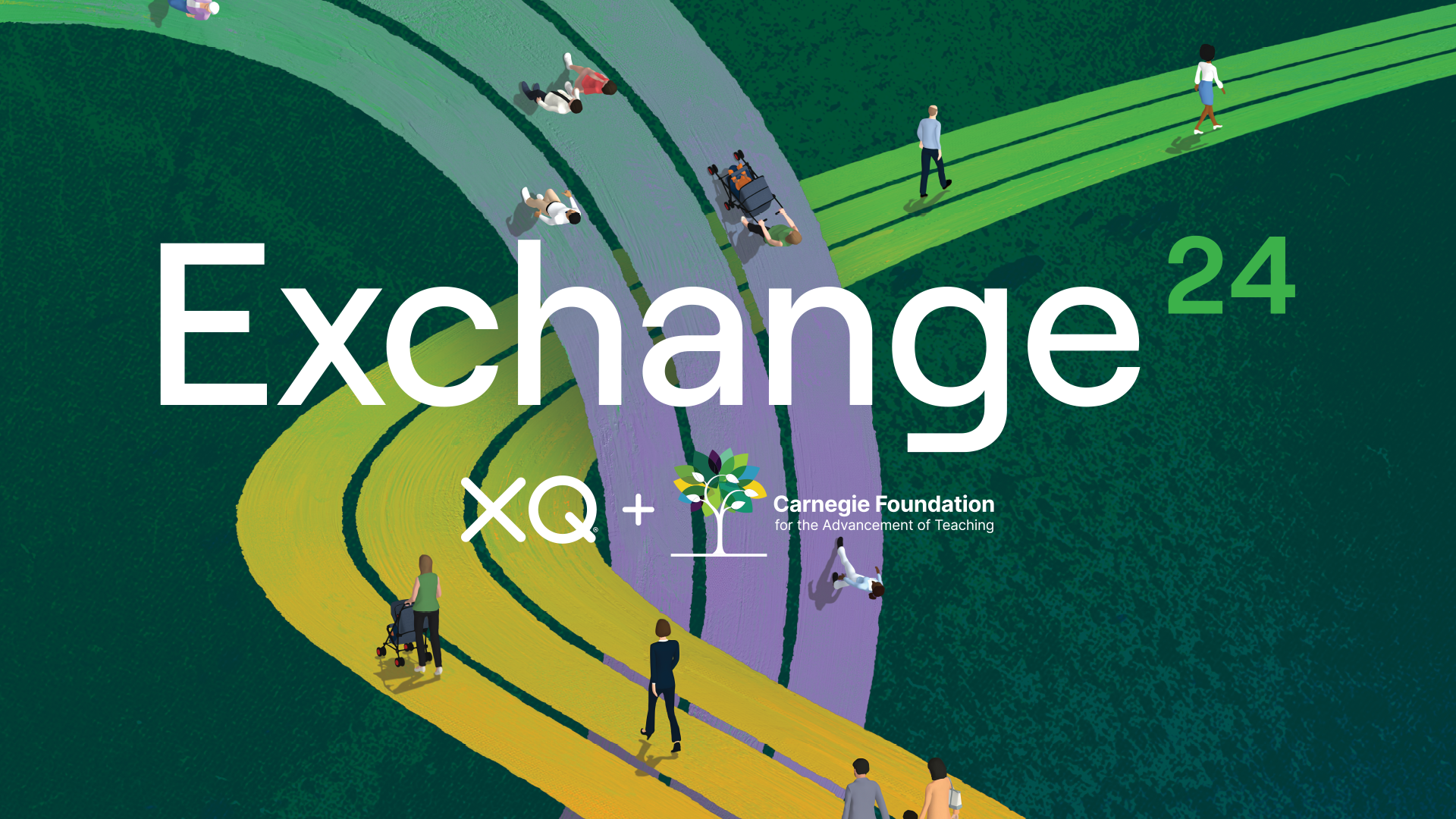I Can Do That! The Computer Science Edition
We spoke to a web developer to learn about her journey and what it takes to succeed in the field. Find out how she did it and how to build your future.

Computer science is everywhere. It’s in our hands in the form of our smartphones. It’s on the GPS in our cars. The computer labs in our schools. The social media we use. This website. As we near the end of 2019, it’s clear as day that its applications range far and wide. That’s why it’s so important for students of all ages to have at least some familiarity with its principles, especially as they rely on problem-solving, logical thinking, and tenacity—skills they’ll need to find success as learners and future professionals. To help them get a greater understanding of this fast-growing industry, we spoke to a professional in the field!
Tiffany Stoik is a web developer, a book lover, and a friend of XQ. We recently took a few minutes to chat about how she found her passion for coding, the importance of the humanities, and how young people can get involved in the computer sciences.
Tell us a little about yourself. Your name. What you do. What you’re working on.
I’m Tiffany Stoik. I’m a frontend web developer, which means I’m responsible for the parts of a website a user’s eyeballs will actually see, like styles, colors, layout, etc. I’m currently working on a lot of projects I didn’t build! I have a small stable of clients that have pre-existing websites they want to adjust and expand as their business grows.
Working in an existing codebase can provide some unique challenges, and it really requires building trust with your clients. Because web development is something most people don’t know much about or really understand, clients don’t have an easy way to vet that what you’re saying is true. You can’t get away with telling someone they need to rebuild an entire portion of their website without having earned some measure of trust from them.
How old were you when you became interested in web development?
I first started playing around with HTML when I was about 12 years old. This was the early 2000s and a lot of personal blogging/journal services were really starting to take off. Diaryland and LiveJournal, in particular, were a big hit with girls my age at the time.
I noticed that other people I followed on these platforms were customizing their journal themes in fun and exciting ways. I started taking free themes from theme sites and tearing them apart to figure out how they worked and making my own. Eventually, I started taking commissions from other people.
Did you study computer science in college?
Despite the fact that I was interested in web development from an early age, I didn’t end up studying it in college. By the time I was graduating from high school, I had decided I didn’t want to ruin my fun hobby by turning it into a job. I ended up getting an English degree instead. I was a voracious reader and it seemed like a good fit.
Once I graduated from university, I was going to go the full academic route. I wanted to get a Ph.D. and teach. I planned on taking a year to get a job and save up money while I studied for the GRE and applied to schools. Well, it turns out that 2010 was a bad time to look for a job. There were no jobs!
My partner was working as a freelance web developer and getting more work than one person could keep up with. He approached me about brushing up my existing skills and helping him out. So I started taking on freelance projects. I still applied to grad school, but by the time my acceptance letters came in, I had settled into my new web developer life, and it seemed like a safer bet than grad school. Apologies to all my wonderful professors who wrote me lovely recommendation letters for nothing!
How did your English degree help inform your approach to web dev? Do you see a tie between the Arts/Humanities and the Sciences?
I think my background in the humanities informs a lot about the work I do and how I approach it. On a very fundamental level, web development was a draw for me as an outlet to help people tell stories. It started with the teenage girls who commissioned themes from me for their very personal and emotional journals. As I started doing web development professionally, I worked with a lot of small companies, non-profits, artists, furniture makers, all sorts of cool projects that were just looking for a way to get their story out into the world.
There’s also the matter of ethics in technology, which I don’t think we talk about enough. Technology is so pervasive in our lives now. When I make a website, there are any number of decisions I have to make that can have a huge impact on people’s lives, even if it’s not immediately obvious.
I feel the weight of those types of choices a lot, and frequently frame it for myself in terms of a narrative. If the user is the protagonist, are my choices in service of that protagonist? Or am I acting in service of the villain? That sense of morality was heavily influenced by a well-rounded liberal arts education.
What kind of digital skills do you need to be successful in this role?
The single most useful skill is knowing how to use search engines efficiently. The best/worst thing about web development is that it is always changing. What you learned yesterday might not apply today. Being able to find the information you’re looking for and being confident that it’s the most up-to-date answer will take you a long way!
If a young person were interested in developing their skills in this field, what resources would you recommend?
There are so many fantastic resources! If you’re someone who really needs a structured learning plan, Codecademy and Treehouse offer courses in a variety of different languages.
For people who are looking for inspiration, something to spark some creativity, Codrops and CodePen are a great way to explore all sorts of cool things other developers are playing around with. I especially love that CodePen lets you fork someone else’s Pen. If something inspires you, you can start working with it and make it your own with little friction. I wish something like CodePen had existed when I was getting started.
CSS Tricks is a huge resource. They have a robust almanac of CSS terms, articles on all the latest web news, video tutorials, and a job board for anyone looking for work. Despite the name, it covers more than just CSS.
STEM still suffers from a lack of diversity. There are wonderful organizations that are trying to change that by injecting more people into the tech pipeline. Girls Who Code has clubs and summer immersion programs for young girls who are interested in learning to code. Outreachy provides internships to work on FOSS (Free and Open Source Software) for people who face underrepresentation, systemic bias or discrimination in tech.
For younger children, Google has a very interesting visual coding language called Scratch.
How can young people get past thinking that something like coding is too hard?
This ties back to the most important digital skill. One of the great things about coding is you’re always doing it on a machine that gives you access to all of the answers! If you can’t remember the name of the function you’re looking for, you can Google it. If you’re not the best at doing math in your head, you can pull up the calculator app.
There are functions that I use every single day that I will never remember the order of arguments. So I Google it, every day! And that doesn’t make me a worse developer. When all of that knowledge exists at your fingertips, you don’t have to feel like you need to memorize everything. Getting into a problem-solving mindset is much more important than collecting infinite trivia about your programming language of choice.
What do teachers need to know to help teach computer science to teenaged learners?
The basics! Both HTML and CSS are very human-readable and easy to get the hang of and I think everyone should develop some experience with them. And once you have those skills, you’ll be surprised how much you can do with them.
There are also companies like CodaKid that develop coding curriculum for teachers to implement and provide resources for educators.
Why is computer science so important in this day and age?
It’s everywhere all the time! Just walk through your home and you’ll be hard-pressed to find a room that isn’t saturated with technology. Think of the last time you spent more than a day without the internet. We’re hyperconnected every single waking moment.
What’s the best advice you’ve received?
A very wise friend of mine once told me “the answer is always no until you ask.” We can get in our own way and give up on something before we’ve even tried. Don’t cheat yourself out of opportunity.
What advice do you have for the young people out there?
Follow the spark! If something makes you curious, get into a Google rabbit hole, get some books about it, find an expert and ask them questions. If something inspires you, channel that inspiration and make something. If something frustrates you, try to fix it or build a better version. When something sparks a feeling in you, follow it and see where it takes you.
WANT TO LEARN MORE ABOUT COMPUTER SCIENCE AND EDUCATION?
Attention teachers and students! Celebrate Computer Science Education Week Dec. 9-16 by learning to code, or teaching your students to code. Whether it’s for an hour or a whole year, Code.org has free lessons available for every grade level and every academic subject, plus ideas to promote computer science education in your school and community.
Not sure where to start? Start at the beginning, by learning about computing pioneer Grace Hopper, who was born Dec. 9, 1906, and to whom Computer Science Education Week is dedicated.









